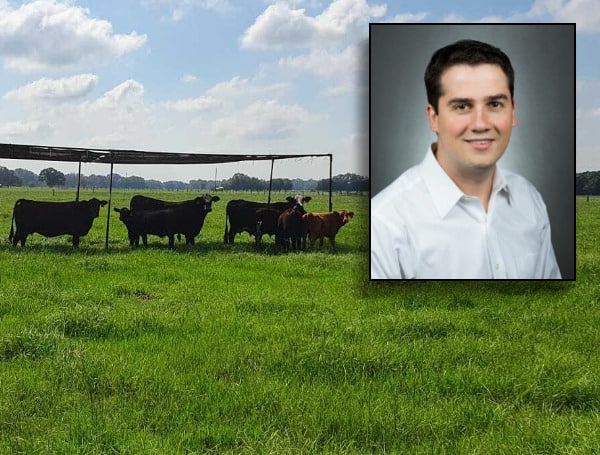Every year across the country, heat causes $300 million in damage to cattle, ample reason for University of Florida scientists to try to cool the animals and increase their beef production.
The newest scientific effort will be led by Philipe Moriel, a UF/IFAS associate professor of beef cattle management. Moriel has received a five-year, $640,000 grant from the National Institute of Food and Agriculture to continue a UF/IFAS-wide effort to help prevent cattle from getting harmed by oppressively warm temperatures.
Scientists already know the long- and short-term effects of heat stress during pregnancy on performance and health of dairy cows. Moriel’s new study will set foundational knowledge of the effects of heat stress on grazing beef cattle.

“This data will help us identity the exact physiological changes occurring in pregnant cows — and then to their offspring — once they are exposed to similar heat,” Moriel said. “This knowledge will allow us to develop novel heat-mitigation strategies to enhance cattle performance and health, which in turn will improve the profitability of cow-calf producers in hot climates.”
He and his team will start their research by reducing heat in pregnant cows. They will follow that by lowering temperatures in their offspring. With cows and calves, scientists will alleviate heat by increasing the animals’ access to shade.
Through these methods, Moriel and his colleagues believe they can help calves grow optimally and produce more beef.
In the news: Florida Gov. DeSantis Releases Pro-Parent School Board Candidate Endorsements
Cow-calf producers are paid by the pound when the calf is weaning. Thus, the heavier the animal, the greater the income. The more they weigh at weaning, the more ranchers make in Florida, Moriel said.
In addition to immunity, scientists will study how attenuating heat helps muscle growth and reproduction as calves grow up.
“We think that by combining research into how heat impacts pregnant cows and their offspring, we can prevent negative long-term effects of scorching temperatures on cattle performance,” said Moriel, a faculty member at the UF/IFAS Range Cattle Research and Education Center in Hardee County. “Cattle will increase their immunity, and they’ll reproduce more successfully.”
Visit Tampafp.com for Politics, Tampa Area Local News, Sports, and National Headlines. Support journalism by clicking here to our GiveSendGo or sign up for our free newsletter by clicking here.
Android Users, Click Here To Download The Free Press App And Never Miss A Story. Follow Us On Facebook Here Or Twitter Here.
Copyright 2022 The Free Press, LLC, tampafp.com. All rights reserved. This material may not be published, broadcast, rewritten, or redistributed.
